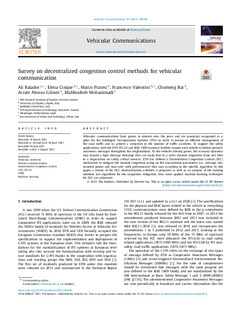
Título
Survey on decentralized congestion control methods for vehicular communicationAutor-a
Autor-a (de otra institución)
Fecha de publicación
2022Otras instituciones
Research Institutes of Sweden (RISE)Università degli Studi dell'Aguila
Radiolabs Consortium
KTH Royal Institute of Technology
Iran University of Science and Technology
Versión
Version publicadaTipo de documento
ArtículoArtículoIdioma
engDerechos
© 2021 The Authors. Published by Elsevier Inc.Acceso
Acceso abiertoVersión del editor
https://doi.org/10.1016/j.vehcom.2021.100394Publicado en
Vehicular Communications Vol. 33. N. artículo 100394, 2022Editor
Elsevier Ltd.Palabras clave
Vehicular networks
Wireless communication
Decentralized congestion control
ETSI ITS-G5 ... [+]
Wireless communication
Decentralized congestion control
ETSI ITS-G5 ... [+]
Vehicular networks
Wireless communication
Decentralized congestion control
ETSI ITS-G5
DSRC
Machine learning [-]
Wireless communication
Decentralized congestion control
ETSI ITS-G5
DSRC
Machine learning [-]
Resumen
Vehicular communications have grown in interest over the years and are nowadays recognized as a pillar for the Intelligent Transportation Systems (ITSs) in order to ensure an efficient management of t ... [+]
Vehicular communications have grown in interest over the years and are nowadays recognized as a pillar for the Intelligent Transportation Systems (ITSs) in order to ensure an efficient management of the road traffic and to achieve a reduction in the number of traffic accidents. To support the safety applications, both the ETSI ITS-G5 and IEEE 1609 standard families require each vehicle to deliver periodic awareness messages throughout the neighborhood. As the vehicles density grows, the scenario dynamics may require a high message exchange that can easily lead to a radio channel congestion issue and then to a degradation on safety critical services. ETSI has defined a Decentralized Congestion Control (DCC) mechanism to mitigate the channel congestion acting on the transmission parameters (i.e., message rate, transmit power and data-rate) with performances that vary according to the specific algorithm. In this paper, a review of the DCC standardization activities is proposed as well as an analysis of the existing methods and algorithms for the congestion mitigation. Also, some applied machine learning techniques for DCC are addressed. [-]
Sponsorship
Comisión EuropeaID Proyecto
info:eu-repo/grantAgreement/EC/H2020/876038/EU/Intelligent Secure Trustable Things/InSecTTColecciones
- Artículos - Ingeniería [756]
El ítem tiene asociados los siguientes ficheros de licencia:





















